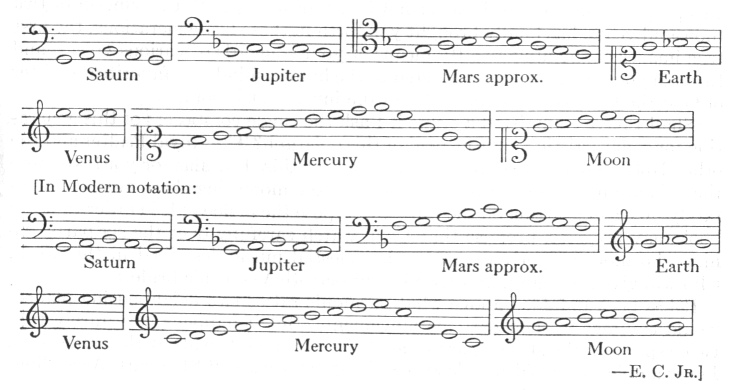"I'm interested in all the sciences---metaphysics, astrology, astronomy, mental physics."
Coltrane's interest in astrology and astronomy surely manifested itself in his music, but how exactly? With song titles like "Mars" and "Leo," Coltrane's last studio recording, released as Interstellar Space, provides an example of the programmatic influence of astrology. But can we find concrete musical examples?
"Venus," another track from that duo recording, displays roughly the same melodic material as a piece recorded by the quartet a few days earlier entitled "Stellar Regions."
Whereas the pieces on the posthumous quartet album Stellar Regions were given their titles by Alice Coltrane, it is not clear whether "Venus" (also released posthumously) was so titled by John Coltrane himself or by someone else. The question of the title is relevant because of the (admittedly tenuous) connection between the melody of "Venus" and the Harmonices Mundi of Johannes Kepler.
In his discussion of the harmonic proportions he claims to have discovered in planetary motion, Kepler asserts that the orbit of the planet Venus can be said to produce the sound of the pitch (E).

Interestingly, the melody of Coltrane's "Venus" emphasizes the pitch (E), as in the manner of a primary tone. As the third degree of an apparent C major tonal center, (E) starts the melodic phrase, and it is privileged above other notes in the number of repetitions it receives (including in the form of a trill with its lower neighbor tone, [D]). A transcription is available in Lewis Porter's book, John Coltrane: His Life and Music, and the voice-leading of the opening phrase can be illustrated thusly:
The phrase in question suggests a polyphonic melody, with a 3-2 stepwise descent in the upper voice accompanied by an inner voice moving by step from the dominant to the leading tone and back. The primary tone (E) returns, and seven additional variations of this thematic material are heard before Coltrane departs into wider-ranging improvisations.
None of the other planet-titled pieces on Interstellar Space ("Mars," "Jupiter," "Saturn") evince any obvious relation to Kepler's speculative notion, and the connection between the (E) of Coltrane's "Venus" and that of Kepler's Harmonices Mundi might well be coincidental. Nevertheless, given Coltrane's astrological interests it is at least possible that he had encountered Kepler's work.


Hey Dan, just wanted to say hi, and that I'll be mentioning this piece and the larger Venus essay in my class today- ( "An Introduction to The Music of John Coltrane") at Williams College. I really appreciate these insights! Hope you're well- Kris Allen
ReplyDelete